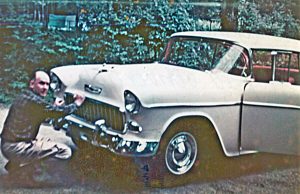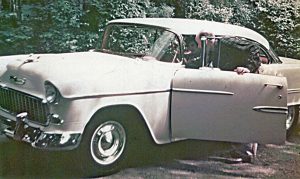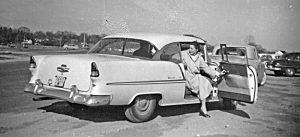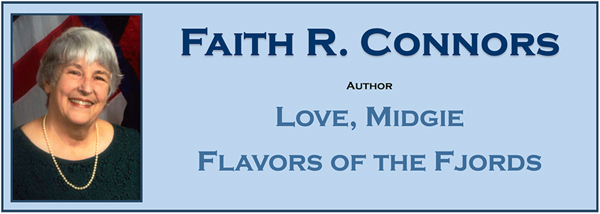An ad in the Stamford Advocate invited job seekers to visit the trailer parked on a vacant lot on Summer Street and apply for openings in a new grocery store. I went early and stood in line, along with some of my high school classmates, to wait in high hopes for an opportunity to fill out papers for a summertime job at the grocery store.
It may have been the summer of 1955 that, paperwork completed, I was initially assigned to work in the cheese room at the Grand Union super market in New Canaan because the new store in Stamford had not yet opened. I think I worked there, temporarily, for at least a few weeks, until the new store opened in Ridgeway Shopping Center in Stamford.

Mother saw the extra miles to be traveled between our town and the next as an opportunity for me to practice my driving, going and coming, from our house on Courtland Avenue to the store some miles away in the middle of New Canaan. She sat in the passenger seat while I drove us over turtle back country roads leading to New Canaan thereby getting some valuable driving experience on a twice daily basis behind the wheel of our 1955 Chevy Bel Air hard-topped convertible, cream colored exterior, and plush red interior. Eight hours later, Mother would arrive to pick me up, slide over to the passenger seat and let me take the wheel for the drive home.
A forty hour week at a dollar an hour wage culminated in the biggest pay check I’d ever gotten, actually the only paycheck I’d ever gotten. Previous jobs I’d had as a baby sitter paid fifty cents an hour, and wages were usually paid by the tot’s mom, digging in her pocketbook for a couple of dollars and change, never in the form of a paycheck. “Chicken feed,” the minister’s wife laughingly called it one afternoon as she handed me my pay.
New Canaan, Connecticut, a quintessentially beautiful New England town, seemed to be filled with architecturally significant houses, often shingle clad in white with forest green shutters. Lawns, gardens and towering maple trees added to the summertime charm.

Sitting on the edge of a loading dock behind the grocery store, scraping the insides of my yogurt carton with a plastic spoon to get the last tastes of a speedy lunch didn’t use up all of the minutes of the lunch half-hour. Twenty minutes or more were left to explore New Canaan on foot. Nearby, Bob’s Sports was loaded with colorful summer fashions, most enticing Bermuda shorts and daring bathing suits. Next visit was to a music store because I wanted to see what records were on the week’s hit parade.
Memorable visits, both, however I didn’t buy anything from either store. New Canaan was far too expensive and trendy for me. I decided to spend some of my first paycheck in Stamford where I thought prices were likely to be much lower.
The transfer to Stamford’s new store brought about an assignment to the “cheese room” where I worked side-by-side with Annie C. (whose middle name is Sands), my friend on Facebook as well as a distant cousin.
It turned out that our mutual distant relative, Mercy Sands Raymond, of Block Island, was enriched by the apron when Captain Kidd filled it with gold coins. Mercy promptly left Block Island, Rhode Island’s pretty locale in the Atlantic Ocean and used the apron full of gold coins to purchase a farm in Connecticut.

Annie and I wore white canvas-like coats and pinned our name tags to our pockets. Annie still has her name tag, all these years later.
Our hours in the cheese room were spent uncrating many kinds of cheese, including huge round boxes of cheddar cheese, scraping the heavy wax fabric covering off them, slicing the wheel of cheese into triangles with a wire cutter, then weighing each of the individual pieces, wrapping them in cellophane, putting price stickers on them, and loading them onto the cheese cart, ready to be wheeled to the refrigerated cheese case in the main store. We’d remove all cheese from the case that had past “use by” dates and put the fresh cheese in the case.
The past “use by” cheese was wheeled back to the cheese room where we unwrapped it, scraped the green stuff off it, rewrapped it, weighed it and put new stickers of “use by” dates and returned the cheese the shelves in the store.
One morning, when I was restocking the cheese case, my high school French teacher, Madame V., leaned toward me from her cart to say, “I admire what you are doing. Save your money and travel!” was her advice. She had done just that as a young woman when she was a member of the Russian Ballet.
Annie and I wanted to taste the cheese. Since daily tasks in the cheese room involved preparing a wide variety of cheeses from all over the world to be sold in the store, we were curious about them and thought about taking a nibble of each just to see what the cheese tasted like.
When we asked the butcher on duty if we could taste the cheese, he chuckled, “Go ahead and eat as much as you like.” Then he cautioned, “The last girl to work in the cheese room ate quite a lot of cheese and had to be sent home with a bottle of Milk of Magnesia.”
We never ate any of the cheese.
(…To be continued. Next adventure: The first paycheck)
Reader Research Notes:
In 1699, the Scottish sailor William Kidd visited Block Island, shortly before he was accused of piracy and hanged. At Block Island he was supplied by Mercy (Sands) Raymond, daughter of the mariner James Sands. The story has it that, for her hospitality, Kidd bade Mrs. Raymond hold out her apron, into which he threw gold and jewels until it was full. After her husband, Joshua Raymond, died, Mercy moved with her family to northern New London, Connecticut (later Montville), where she bought much land. The Raymond family was thus said to have been “enriched by the apron”.[20] Wikipedia
